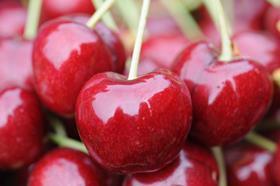
British cherry growers are on course for their most productive season for over 30 years, the latest industry figures reveal.
According to British Summer Fruits data, running to 24 August 2015, since the start of the British cherry season in May, growers have produced 2,682 tonnes - an uplift of 80 per cent on the 1,488 tonnes produced in 2014.
And Tesco has seen record sales of nearly 80 per cent compared with what it sold in 2014.
The greater availability has led to Tesco more than doubling the amount of cherries it buys from British growers this summer.
Last year the supermarket bought more than 335 tonnes of British grown cherries while this year, it took more than 750 tonnes – a rise of 125 per cent.
Tesco cherry buyer Tom Emmett, said: “Shoppers prefer British cherries as they’re considered to be among the best in the world – not only the richness of their taste but also the juiciness of their flesh and overall texture. Nothing beats a British cherry.
“[But] It’s all about availability - if we can get British grown cherries then we know our shoppers will buy them. They are extremely popular and one of the absolute joys of summer.”
Production hit rock bottom in the UK in 2000 when the entire British cherry industry produced just 400 tonnes. But since then things have slowly started looking up again.
MD of cherry producer Haygrove, James Waltham, said:“Thanks to a combination of great varieties which are better suited to the UK climate, year-on-year performance of cherry orchards in general is far more consistent than it used to be, bringing greater yield and superior quality fruit.
“The British cherry season is also growing. Where it once lasted barely two months, the season now extends from early June until early September; thanks both to new varieties and modern growing systems, particularly the use of polytunnels.
“We’ve also had a good growing season. After a mild autumn in 2014, followed by a winter that was sufficiently cold, we had good weather for pollination at spring. Weather through the summer has also been relatively good with no periods of excessive heat.'



